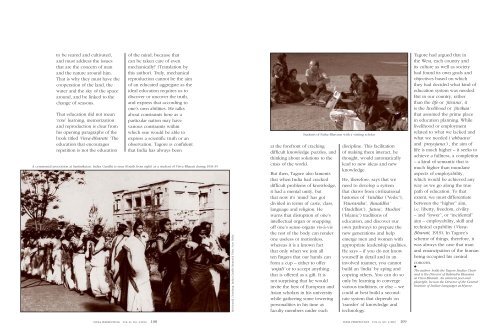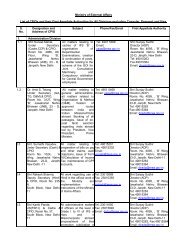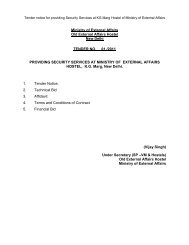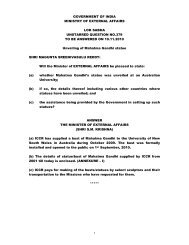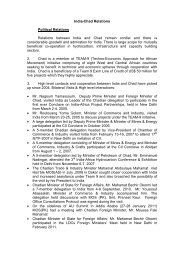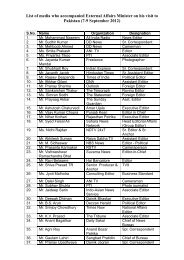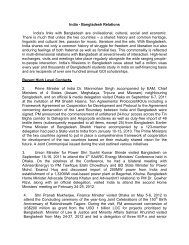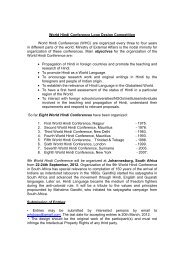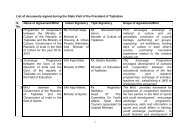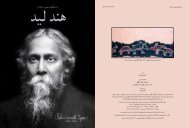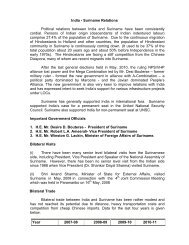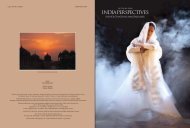IP_ Tagore Issue - Final.indd - high commission of india mauritius
IP_ Tagore Issue - Final.indd - high commission of india mauritius
IP_ Tagore Issue - Final.indd - high commission of india mauritius
Create successful ePaper yourself
Turn your PDF publications into a flip-book with our unique Google optimized e-Paper software.
to be reared and cultivated,and must address the issuesthat are the concern <strong>of</strong> manand the nature around him.That is why they must have thecooperation <strong>of</strong> the land, thewater and the sky <strong>of</strong> the spacearound, and be linked to thechange <strong>of</strong> seasons.That education did not mean‘rote’ learning, memorizationand reproduction is clear fromhis opening paragraphs <strong>of</strong> thebook titled Visva-Bharati: ‘Theeducation that encouragesrepetition is not the education<strong>of</strong> the mind, because thatcan be taken care <strong>of</strong> evenmechanically!’ (Translation bythis author). Truly, mechanicalreproduction cannot be the aim<strong>of</strong> an educated aggregate as theideal education requires us todiscover or uncover the truth,and express that according toone’s own abilities. He talksabout constraints here as aparticular nation may havevarious constraints withinwhich one would be able toexpress a scientific truth or anobservation. <strong>Tagore</strong> is confidentthat India has always beenA ceremonial procession at Santiniketan. Indira Gandhi is seen (fourth from right) as a student <strong>of</strong> Visva-Bharati during 1934-35Mit freundl. Genehmg: Indira Gandhi Memorial Trust, New DelhiStudents <strong>of</strong> Patha-Bhavana with a visiting scholarat the forefront <strong>of</strong> crackingdifficult knowledge puzzles, andthinking about solutions to thecrisis <strong>of</strong> the world.But then, <strong>Tagore</strong> also lamentsthat when India had crackeddifficult problems <strong>of</strong> knowledge,it had a mental unity, butthat now it’s ‘mind’ has gotdivided in terms <strong>of</strong> caste, class,language and religion. Hewarns that disruption <strong>of</strong> one’sintellectual organ or snapping<strong>of</strong>f one’s sense-organs vis-à-visthe rest <strong>of</strong> the body can renderone useless or motionless,whereas it is a known factthat only when we join allten fingers that our hands canform a cup – either to <strong>of</strong>fer‘anjali’ or to accept anythingthat is <strong>of</strong>fered as a gift. It isnot surprising that he wouldinvite the best <strong>of</strong> European andAsian scholars in his universitywhile gathering some toweringpersonalities in his time asfaculty members under eachdiscipline. This facilitation<strong>of</strong> making them interact, hethought, would automaticallylead to new ideas and newknowledge.He, therefore, says that weneed to develop a systemthat draws from civilizationalhistories <strong>of</strong> ‘Vaidika’ (‘Vedic’),‘Pauranika’, ‘Bauddha’(‘Buddhist’), ‘Jaina’, ‘Muslim’(‘Islamic’) traditions <strong>of</strong>education, and discover ourown pathways to prepare thenew generations and helpemerge men and women withappropriate leadership qualities.He says – if you do not knowyourself in detail and in aninvolved manner, you cannotbuild an ‘India’ by aping andcopying others. You can do soonly by learning to convergevarious traditions, or else – wecould at best build a secondratesystem that depends on‘transfer’ <strong>of</strong> knowledge andtechnology.<strong>Tagore</strong> had argued that inthe West, each country andits culture as well as societyhad found its own goals andobjectives based on whichthey had decided what kind <strong>of</strong>education system was needed.But in our country, ratherthan the life or ‘jiivana’, itis the livelihood or ‘jiivikaa’that assumed the prime placein education planning. Whilelivelihood or employmentrelated to what we lacked andwhat we needed (‘abhaava’and ‘prayojana’) , the aim <strong>of</strong>life is much <strong>high</strong>er – it seeks toachieve a fullness, a completion– a kind <strong>of</strong> semantic that ismuch <strong>high</strong>er than mundaneaspects <strong>of</strong> employability,which would be achieved anyway as we go along the truepath <strong>of</strong> education. To thatextent, we must differentiatebetween the “<strong>high</strong>er” aim,i.e. liberty, freedom, civility– and “lower”, or “incidental”aim – employability, skill andtechnical capability (Visva-Bharati, 1919). In <strong>Tagore</strong>’sscheme <strong>of</strong> things, therefore, itwas always the case that manand emancipation <strong>of</strong> the humanbeing occupied his centralconcern.◆The author holds the <strong>Tagore</strong> Studies Chairand is the Director <strong>of</strong> Rabindra Bhavanaat Visva-Bharati. An eminent poet andplayright, he was the Director <strong>of</strong> the CentralInstitute <strong>of</strong> Indian Languages at Mysore.INDIA PERSPECTIVES VOL 24 NO. 2/2010 108 INDIA PERSPECTIVES VOL 24 NO. 2/2010 109


